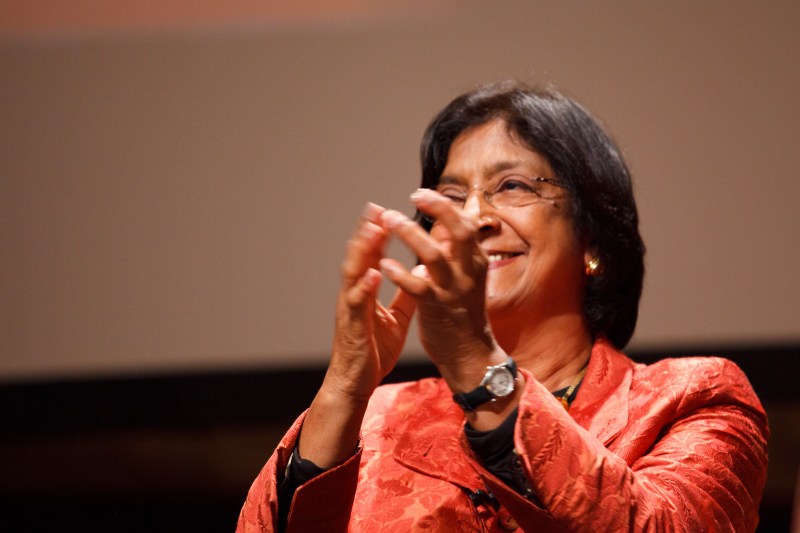Former UN High Commissioner for Human Rights Navi Pillay reflected upon her history in law and human rights, calling for students to stand up for global human rights during a campus roundtable discussion on Monday.
Pillay, who served as the High Commissioner from 2008-2014, traced her dedication to human rights to her childhood in South Africa where, as a woman of color, she faced discrimination.
“Every person of color in South Africa knew their parents weren’t treated with respect,” she said. “It hurts as a child.”
Pillay pushed back against this discrimination, becoming the first woman to open her own law practice in her home province of Natal in 1967. She also served as the first non-white woman judge of the High Court of South Africa, as President of the International Criminal Tribunal for Rwanda and as Commissioner of the International Commission Against the Death Penalty.
“You have to be aware of the situation around you and know that there are others less privileged around you,” Pillay said.
Pillay highlighted countries’ claims to sovereignty and the lack of reform in the UN as challenges to human rights development today.
“Human rights is still very limiting,” Pillay said. “We are not dealing with the macro challenges of big powers following their own geographic and political interests rather than the interests of the people.”
Despite the challenges, Pillay remains optimistic about the prospect for human rights development.
“Human rights development means equality and equal resources for everyone.” Pillay said. “Every change that has come about so far has happened because of civil societies push, so we have to raise our voices and say, ‘This is not right.’”
As the UN High Commissioner for Human Rights, Pillay advocated for gender equality and human rights in international crises such as the Sri Lankan Civil War and the Syrian Civil War.
When asked about dealing with the stress of the job, Pillay said she kept her head up knowing that she was serving others and “speaking with students.”
She encouraged younger generations to question modern societal norms and voice their concerns about modern issues to which older generations, including her own, may have become accustomed. She stressed the importance of even small steps in leading to significant change.
“I feel like it will come to you [the student] when you look around and [ask], ‘Why is this been happening for so long?’ You will question the norm,” she said.
The event was sponsored by the WSD Handa Center and the Stanford Global Development Association (SGDA). Seats were limited, with preference going to “SGDA members, students affiliated with the Handa Center and students who demonstrate a keen interest in the field of Human Rights through their responses” to a signup form.
SGDA Human Rights team co-director Lucy Arnold ’20 said she found Pillay’s words to be inspiring, helping students get a grasp on how to start a journey in human rights advocacy.
“Human rights work can seem very intimidating and sometimes disillusioning,” Arnold said. “[But] I’m hopeful that more people have more ideas about how anything that they do can contribute and that it’s okay to start small.”
“I’ve learned how we can use law as a tool to make proactive change and not reactive or constrictive,” said Sarah Goodman ’20.
Now retired, Pillay still pushes for people to be aware of global crises. She stressed that anyone can contribute towards a greater good, no matter how small.
“Don’t try to change the world in one day,” Pillay said. “But every effort counts.”
Contact Aparna Verma at averma2 ‘at’ stanford.edu and Daniel Yang at danieljy ‘at’ stanford.edu.
